Good to have you on board! Here’s your latest Today in Slovakia – Tuesday’s top news, all in one place.
Before we get to the digest, a quick word from our publisher, Ján Pallo, who reminds us that The Slovak Spectator has turned 30 — a milestone we would not have reached without you!
Right, back to the news.
MPs refuse police brutality report
The government’s ruling coalition on Tuesday blocked a parliamentary debate on a special report by Ombudsman Róbert Dobrovodský, which details systemic police brutality and alleged human rights violations spanning more than a decade.
Dobrovodský submitted the report to parliament late last week, urging lawmakers to address its findings during the ongoing session. “It is important that the parliament familiarises itself with the report,” he said. But despite its urgency, the coalition refused to include it on the agenda — a move immediately criticised by opposition MPs.
The ombudsman was clear that the report does not suggest all officers are abusive or that policing should be curtailed. “But given that the police are the only institution with a legal monopoly on the use of force, we must ask: who watches the watchmen?” he said.
Parliament has a track record of ignoring ombudsman reports. When Dobrovodský’s predecessors Jana Dubovcová and Mária Patakyová presented their findings, the chamber was mostly empty, with vacant seats outnumbering MPs.
Dobrovodský will have to wait until 27 May for the next session — the last before the summer break.
13: The report covers a 13-year period and documents a string of incidents in which police officers allegedly violated individuals’ rights, raising serious questions about accountability and oversight within Slovakia’s law enforcement institutions.
Motivation for the report: The immediate trigger was the 2024 death of a homeless man following a police intervention in Košice. While the governing coalition has sought to frame such cases as isolated misconduct by individual officers, Dobrovodský argues the problem is systemic and deeply rooted.
Several other cases: The report highlights 11 cases of alleged brutality and unlawful detention. In one, a man with broken heels was held for several days in 2021 in a barred room at a Bratislava police station — with no toilet and limited mobility. In another, two boys detained near Košice in 2019 were allegedly beaten during and after their transfer; their female relatives, brought in as witnesses, said they were locked in a storage room off camera. In 2016, police in Lučenec handcuffed a man and kept him in a room without a bed or toilet for two days. A medical assessment later confirmed he had suffered multiple injuries, which police were unable to explain. One case involved a home search targeting an elderly woman, during which officers allegedly used excessive force. The report criticised major gaps in police documentation and noted there was no clear explanation of the woman’s alleged offence.
Recommendations: Dobrovodský’s report offers both legislative and non-legislative proposals. Legislative recommendations include tighter rules on coercive tools and new legal standards for the facilities used during searches. Non-legislative measures focus on everyday practice and oversight, including: mandatory body-worn cameras; regular, reinforced parliamentary inspections; audiovisual recording in interview rooms; and compulsory human rights training for officers involved in coercive actions.
Police response: The Slovak police have yet to take a position on the report, saying they must first familiarise themselves with its contents.
Interior Ministry: The ministry noted that nearly all the cases outlined occurred before the current leadership took office. It emphasised its ongoing efforts to professionalise the force, including de-escalation and communication training in cooperation with psychologists. A pilot body-camera scheme launched in Košice and Bratislava is now expanding to Banská Bystrica, with early results suggesting improved behaviour from both officers and the public when interactions are recorded.
Opposition reaction: Progressive Slovakia MP Martin Dubéci accused the coalition of showing no interest in the rule of law when faced with an independent report outlining the systemic abuse of ordinary citizens. He noted the hypocrisy of Smer — the dominant coalition party led by Prime Minister Robert Fico — which, while in opposition (2020–2023), repeatedly held press conferences criticising excessive police force during house searches and the detention conditions of individuals close to the opposition.
MORE STORIES FROM THE SLOVAK SPECTATOR
Cellar crawl: Bratislava’s Rača district uncorks spring with Koštúfka — a wine-soaked weekend of local pours, cellar chats, and centuries-old charm.
Ghost frames: Unearthed film reels show a tender, fading writer, P. O. Hviezdoslav — from public icon to private goodbye.
Muted greats: Despite hosting legends like Benny Golson, Jazz Prešov was denied state funding as political appointees snubbed expert advice and backed obscure newcomers instead.
Money trail: One year after Peter Pellegrini’s presidential win, a murky web of party insiders, opaque donations, and eyebrow-raising benefactors is coming to light.
Pedal stalled: Bratislava’s cycling ambitions hit a roadblock as last year’s meagre progress raises serious doubts about meeting 2030 goals.
If you like what we are doing and want to support good journalism, buy our online subscription with no ads and a print copy of The Slovak Spectator sent to your home in Slovakia. Thank you.
OPINION
A newspaper that defied the odds
Sme editor-in-chief Beata Balogová charts the improbable rise of The Slovak Spectator — launched by four Americans in post-communist Bratislava — from an expat side project to a newsroom with staying power. What began as a cultural curiosity evolved into a trusted outlet that, Balogová argues, still matters in an age of disinformation and shrinking trust in the media.
THE FACE OF 1990s UNDERWORLD BRUTALITY
Slovakia’s most infamous mobster could walk free after 27 years
Mikuláš Černák — the former mafia boss whose name became shorthand for the blood-soaked chaos of Slovakia’s post-communist 1990s — will appear before the Trnava District Court on Wednesday, 2 April, with a shot at freedom. After nearly three decades behind bars for extortion and six brutal murders, a civic association has filed a request for his conditional release — a request Černák himself has endorsed, expressing remorse for his crimes.
Now serving a life sentence, Černák was convicted of participating in six murders between 1994 and 1997, all carried out with what judges called “exceptional cruelty and contemptible motives”. He later admitted to 14 killings as part of a 2020 plea deal. Slovak law allows for parole after 25 years for lifers who meet strict conditions — and Černák believes he has done just that.
IN OTHER NEWS
Nearly half of Slovaks believe a key narrative of Kremlin propaganda — that Russia invaded Ukraine to stop an alleged genocide against Russian speakers by the Zelensky government. A Focus/Globsec poll across four countries (Poland, Hungary, Slovakia and Romania) found Slovakia to be the most conspiracy-prone, with 44 percent endorsing the claim and just 39 percent rejecting it. (Sme)
Brussels has frozen €27 million from Slovakia’s recovery plan over the stalled buyout of private land in national parks — a project blocked by Environment Minister Tomáš Taraba. While Deputy PM Peter Kmec insists the funds are not lost and will be reallocated, the Commission has given Slovakia one month to respond. (Denník N)
Authorities have banned public access to forests in the Záhorie region and the Little Carpathians until further notice, as part of emergency measures to contain the spread of foot-and-mouth disease. The restriction also covers military zones, affecting dozens of areas including Malacky, Lozorno and Kuchyňa. (Agriculture Ministry)
Slovak climatologist Jozef Pecho has resigned from the Slovak Hydrometeorological Institute after nearly 15 years, citing a toxic workplace culture marked by intimidation, mismanagement and disdain for expertise. In a scathing public statement, Pecho accused the institute’s leadership of eroding professionalism and claimed the Environment Ministry is either complicit or silently enabling the decline.
Jozef Krošlák, a former spokesperson for authoritarian-era Prime Minister Vladimír Mečiar, has been elected chair of Slovakia’s new public broadcaster (STVR) council, with Culture Ministry official and Putin admirer Lukáš Machala as his deputy. The nine-member council — stacked with allies of the ruling coalition — will soon appoint the broadcaster’s new director.
Slovakia’s conflict of interest committee has launched proceedings against opposition MP Veronika Remišová and Defence Minister Robert Kaliňák over a villa in Croatia. Kaliňák admitted breaking the law by failing to declare his wife’s property, but accused Remišová of leaking the information — while she now faces a fine and possible removal as committee chair.
Slovakia has the worst public finance sustainability in the European Union, according to the European Commission’s latest data. It is also the only EU country currently classified as high-risk, the Council for Budget Responsibility has warned.
Slovakia’s population shrank for the fourth year in a row in 2024, falling by over 5,200 people — the longest sustained decline since independence. Despite net migration remaining positive, a persistently low birth rate continues to drive the country’s overall demographic downturn.
Towns across Slovakia will see fresh protests on Thursday and Friday under the banner “No to the Russian law”, as activists rally against a proposed bill targeting NGOs. Organisers say it marks the most serious assault on civil society since the era of Vladimír Mečiar, with Bratislava set to host its first protest march since the anti-government protests began.
WEDNESDAY WEATHER BRIEFING: Expect scattered showers or rain throughout the day, with snow at higher elevations. Daytime temperatures will range from 8°C to 16°C. A brisk northerly wind of up to 50 km/h, with occasional gusts reaching 70 km/h — and mountain areas facing gale-force conditions. (SHMÚ)
HAPPY NAME DAY: April 2 is a special day for Zita, so if you know one, don’t forget to send your warmest wishes. Všetko najlepšie!
Thank you for subscribing and reading. It means a lot to us.
P.S. If you have suggestions on how our news overview can be improved, you can reach us at editorial@spectator.sk.
Follow The Slovak Spectator on Facebook, LinkedIn and Instagram(@slovakspectator). For news from Slovakia in Ukrainian, click here or follow Novyny on Telegram, Facebook, and Instagram.


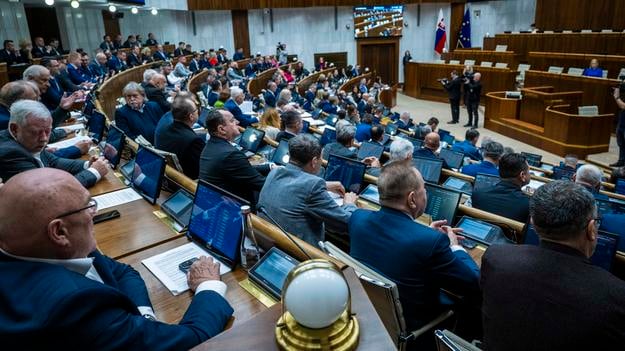 MPs in the chamber on April 1, 2025. (source: TASR - Jakub Kotian)
MPs in the chamber on April 1, 2025. (source: TASR - Jakub Kotian)
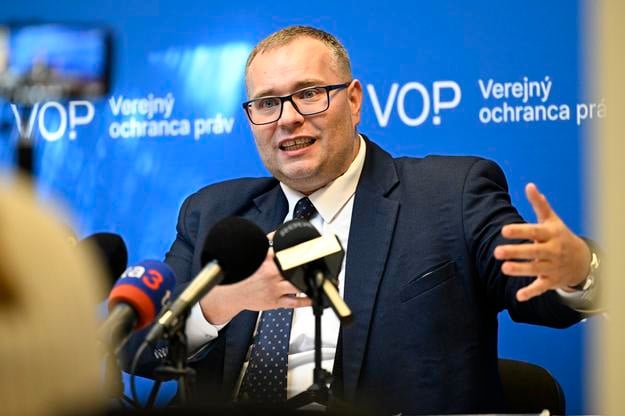 Ombudsman Róbert Dobrovodský during a press conference on March 31, 2025 in Bratislava. (source: TASR - Pavel Neubauer)
Ombudsman Róbert Dobrovodský during a press conference on March 31, 2025 in Bratislava. (source: TASR - Pavel Neubauer)
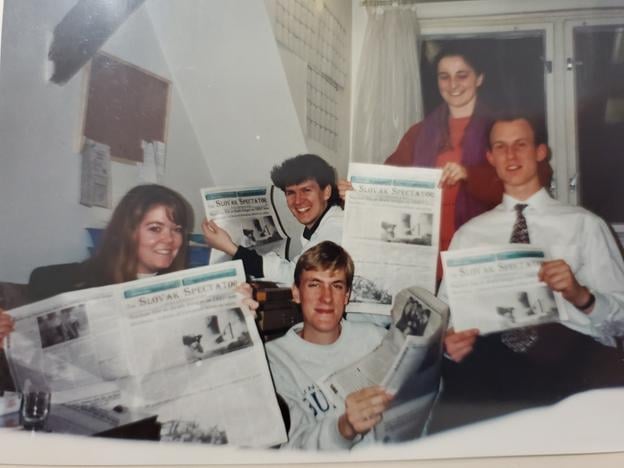 The first issue of The Slovak Spectator. (source: Dan Stoll's archive)
The first issue of The Slovak Spectator. (source: Dan Stoll's archive)
 Mikuláš Černák arrives at the court in Piešťany on 2 May 2024. (source: TASR - Jaroslav Novák)
Mikuláš Černák arrives at the court in Piešťany on 2 May 2024. (source: TASR - Jaroslav Novák)
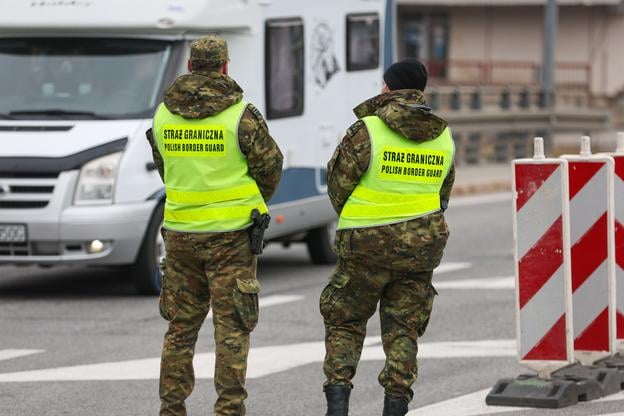 Polish police stepped up patrols at the Chyżné–Trstená border crossing with Slovakia on 1 April, as Warsaw tightened controls in response to a potential outbreak of foot-and-mouth disease. Prime Minister Donald Tusk said the new measures will also apply to borders with the Czech Republic and Germany. (source: TASR/PAP - Grzegorz Momot)
Polish police stepped up patrols at the Chyżné–Trstená border crossing with Slovakia on 1 April, as Warsaw tightened controls in response to a potential outbreak of foot-and-mouth disease. Prime Minister Donald Tusk said the new measures will also apply to borders with the Czech Republic and Germany. (source: TASR/PAP - Grzegorz Momot)
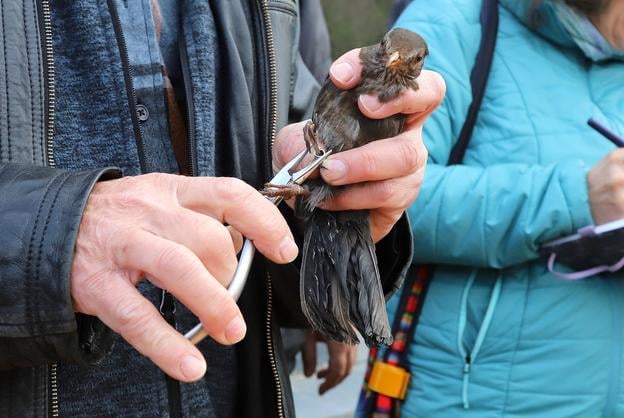 Welcoming the winged messengers of spring marked the start of the visitor season at the Borová Hora Arboretum of the Technical University in Zvolen on Tuesday, 1 April 2025. Visitors had the chance to observe bird catching and ringing in collaboration with experts from the Institute of Forest Ecology at the Slovak Academy of Sciences, and to learn more about birdwatching and birdsong. (source: TASR - Ján Krošlák)
Welcoming the winged messengers of spring marked the start of the visitor season at the Borová Hora Arboretum of the Technical University in Zvolen on Tuesday, 1 April 2025. Visitors had the chance to observe bird catching and ringing in collaboration with experts from the Institute of Forest Ecology at the Slovak Academy of Sciences, and to learn more about birdwatching and birdsong. (source: TASR - Ján Krošlák)